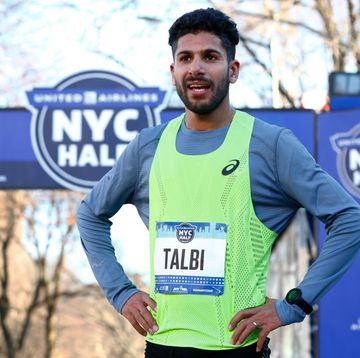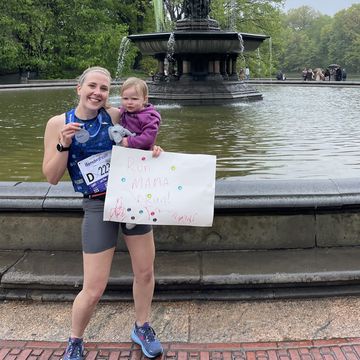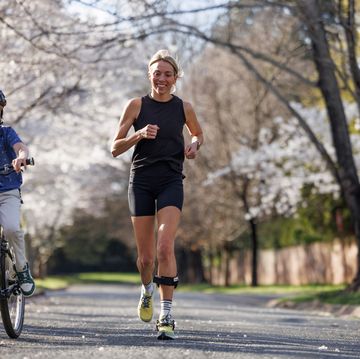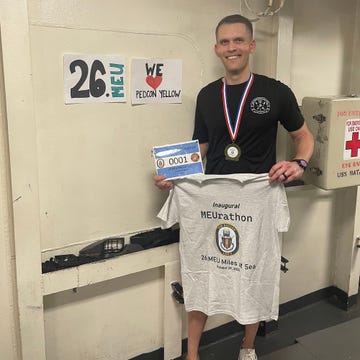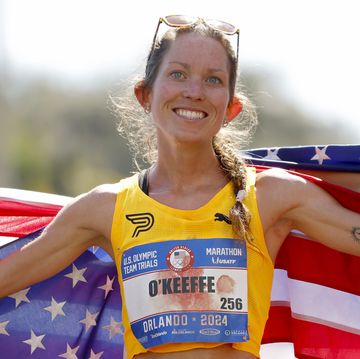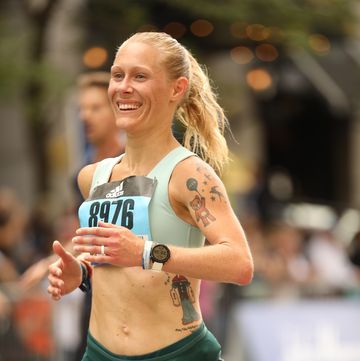One year after undergoing surgery to combat uncontrollable weight gain, a 13-year-old Texas girl showed how far she has come in her recovery by participating in two road races—her first 3K and 5K—last month, PEOPLE reported.
No member of Alexis Shapiro’s family had taken part in a road race before, but when she expressed interest in doing a 5K they helped her find the Carnival of Venice 5K in San Antonio, Texas, and joined her during the race.
“It was so much fun. She loved it,” Jenny Shapiro, Alexis' mother, told Runner’s World Newswire. “She was proud of herself, I was proud of her. We were just all surprised and amazed.”
Alexis Shapiro led a relatively typical life until the age of 9, when she began experiencing headaches and her parents noticed she wasn’t growing at a normal rate. An MRI revealed a non-cancerous brain tumor that needed to be removed. The tumor was so close to Alexis’ pituitary gland and hypothalamus, however, that either the surgery or the tumor damaged both.
Jenny Shapiro knew going into the surgery that weight gain was a likely side effect, but she and her husband Ian were unprepared for the effect it had on Alexis.
“She seemed to get the worst of the hypothalamic obesity,” Jenny Shapiro said. “Most kids gain weight, but it seemed like Alexis just had it really, really bad. She was, on average, gaining like two pounds a week.”
Prior to her brain tumor, Alexis weighed 52 pounds. A little over two years later her weight had nearly quadrupled as she carried about 203 pounds on her 4-foot-7 frame. Alexis was always hungry, which made her continue to gain weight and put her health at greater risk.
Then the Shapiros found Dr. Thomas Inge of Cincinnati Children’s Hospital. He was prepared to perform gastric bypass or a sleeve gastrectomy on Alexis, but the first challenge was that the Shapiros' insurance was initially not willing to cover the procedure because Alexis, then 12, was too young. The Shapiros began a crowdfunding campaign to cover the cost of the surgery. Thanks to the national attention their story received from outlets like NBC News and PEOPLE, Jenny Shapiro estimates they raised about $70,000.
This also caused the insurance company to reverse its initial decision and cover the procedure. The Shapiros have used the funds raised to cover the cost of travel between their Texas home and Cincinnati—where Alexis’ surgery was performed—and to deal with other expenses related to the medical condition.
The Shapiros and Dr. Inge initially hoped that Alexis would be a good candidate for gastric bypass because it’s proven to be more effective in these cases, but it was not safe to perform a bypass because Alexis' liver was so enlarged. Instead, she had the sleeve gastrectomy in March of 2014, which reduced her stomach to one-quarter of its original size.
Because of the changes to her stomach, Alexis now must eat 60 grams of protein each day and can only eat a small amount of food in one sitting. It’s an adjustment, but it's one Alexis is used to by now.
“I think she’s really tough for being able to put up with everything and [for] taking it in stride,” Jenny Shapiro said.
Since the surgery, Alexis has lost about 60 pounds, though she has since regained about 10 of them. She also had a big uptick in her energy levels.
“Right away, after bariatric surgery, she wanted to climb the stairs in the hotel, she wanted to walk laps,” Jenny Shapiro said. “She just wanted to do this stuff. I encourage her, of course, but definitely don’t have to nag her.”
Jenny Shapiro said that sharing Alexis’ journey with the public has helped her daughter feel supported. The family’s Facebook page in support of Alexis has more than 13,000 likes.
“I think it’s helped her a ton," Jenny Shapiro said, "because she was used to people poking fun at her, pointing and wondering, and little kids asking questions.”
Jenny Shapiro is quick to point out that Alexis is currently walking the road races she participates in, but being able to cover 3.1 miles on foot is a huge step in the right direction.
“She definitely wants to keep doing it, so I think we’ll do one about once a month," she said. "Maybe she can get faster, or maybe she’ll just continue to walk them."


